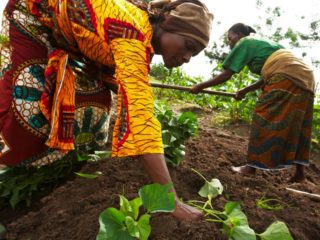Why CBN created Anchor Borrowers’ Programme
Mr. Godwin Emefiele, Governor, Central Bank of Nigeria
(CBN), has said the Anchor Borrowers’ Programme (ABP) initiative is designed to
complement other agricultural programmes in the country.
Emefiele who disclosed this at the formal flag off of the
rice dry season farming in Jibia, Katsina State last year said Nigeria’s food
import bills was exceptionally high, adding that rice and wheat formed part of
four items that gulped a whopping N1 trillion in foreign exchange.
He explained that the
ABP became imperative when the government realized that food imports had fueled
domestic inflation, depleted foreign reserves, displaced local production and
created unemployment. He noted that import dependency especially on commodities
of comparative advantage was neither acceptable nor sustainable.
He said with the fast depletion of rice reserve in the
country, it became obvious that Nigeria could not afford to sustain rice
importation. The first step in curtailing this, according to him, is to exclude
rice from the forex eligibility list.
Emefiele also enumerated ABP’s challenges since its creation
to include low yield rice varieties; poor farming practices and lack of good
quality farm inputs, non-utilization of available cultivable lands; manual
system of production and inadequate funding for the establishment and
development of nucleus farms and small farmers out-grower schemes.
He also listed expectations from the ABP to include increase
in the ratio of agricultural lending from 3.72 per cent of total bank lending
in 2014 to 7.0 per cent; increased capacity utilization from the current level
of less than 50 per cent to about 80 per cent; and empowering of at least
600,000 farmers in the rice, oil palm, wheat, cotton and fish value chains.
Others are sorghum, maize, millet, tomatoes etc.
Other ABP targets achievable by 2021 would be the creation
of at least 1,000,000 direct and indirect jobs in the processing segment of the
identified value chains; reducing Nigeria’s import bill on the identified
commodities by at least 10 per cent annually.
Alhaji Aminu Bello Masari, Governor of Katsina State, said
the state had set aside N8bn for agric sector in its 2017 budget, adding that
over 20,000 farmers were expected to participate in the ABP in the state.
Masari, who described
the ABP as a change initiative, also unveiled plans by the state to help
farmers. He also mentioned a budgetary allocation of N300 million for
rehabilitation and expansion of 10 dams, as well as establishment of a rice
resource centre and a reservoir in Daudawa and Dandume towns respectively.







Comments
Post a Comment